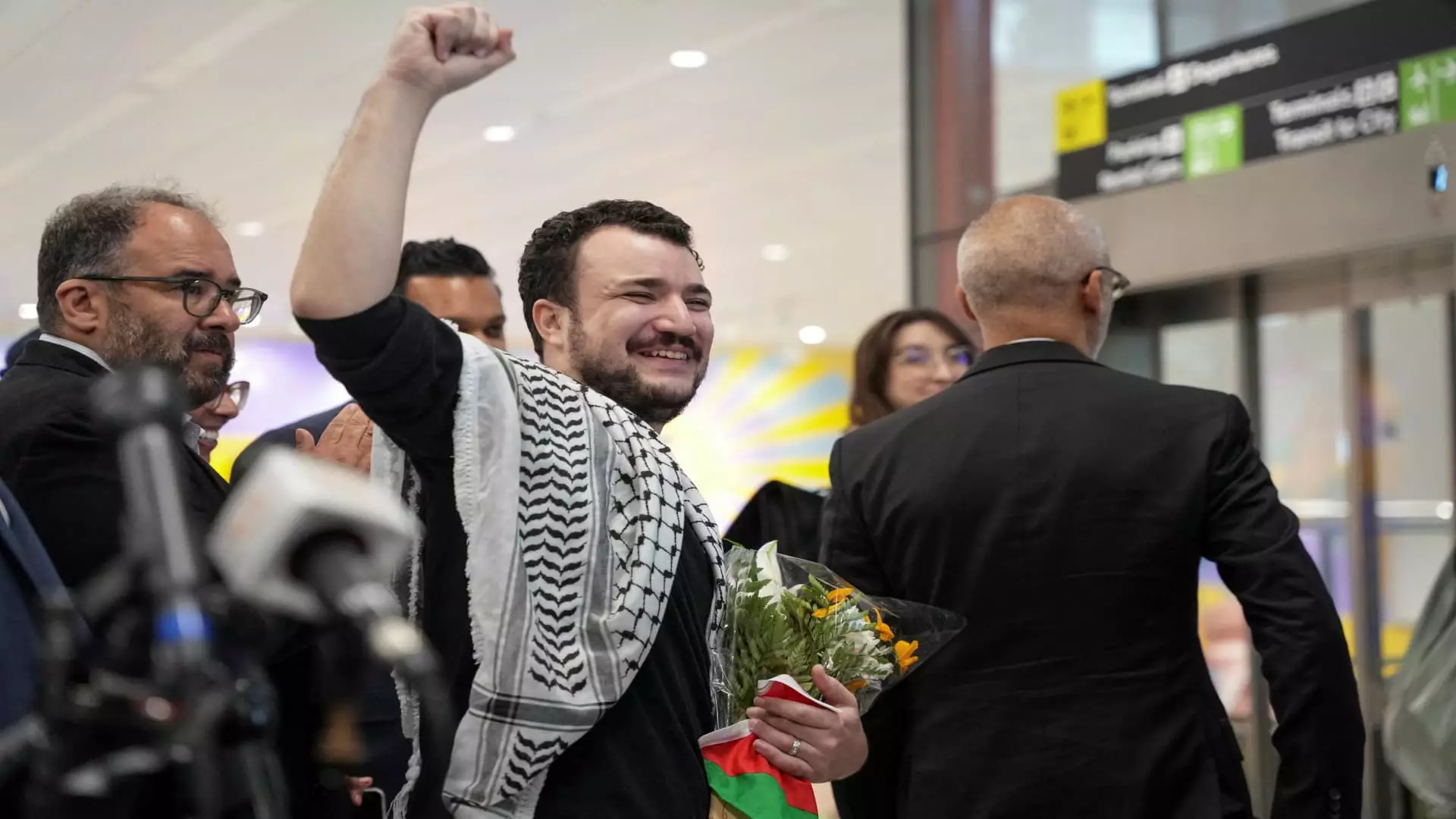The story of Mahmoud Khalil, a 30-year-old Columbia University student, provides shocking insight into the darker corners of government repression, particularly against voices challenging state policies. Khalil’s experience of being detained by Immigration and Customs Enforcement (ICE) for over three months serves not just as a narrative of one person’s suffering, but as a glaring indictment of an administration willing to weaponize immigration laws to silence dissent. His defiance upon release—standing firm against both the U.S. government and his own university—speaks volumes about the lengths to which activists must go to defend their voices in an increasingly authoritarian climate.
Khalil was arrested in March at his university housing in New York, thrust into a detention facility located thousands of miles away in Louisiana. This jarring transition from student to detainee serves as a stark reminder of the dislocating power wielded by immigration authorities who push their agenda under the guise of “national security.” It is precisely this narrative of displacement and confinement that shines a light on the ongoing battle between activism and institutional oppression.
A Stand Against Genocide
In his first remarks upon returning to Newark, Khalil made it abundantly clear that he is not simply concerned about his own emancipation; he is fighting a much larger battle against what he termed “genocide” occurring in Gaza. His words resonate powerfully with the sentiments of many activists who view silence as complicity. The fact that the U.S. government, and by extension Columbia University, is perceived to be complicit through funding and investments raises uncomfortable questions about ethical responsibilities.
What Khalil’s story reveals is far more profound than a legal struggle; it is a morally imperative call to action. Khalil has thus transformed his own personal agony into a platform for broader discourse on international human rights, compelling those of us who prefer quietude to reconsider our roles in this chaotic narrative. Khalil’s assertion, “Even if they would kill me, I would still speak up for Gaza,” ensures his sacrifice would not be in vain. This fierce commitment to activism in the face of tyranny is a rallying cry that resonates with all who value freedom of speech and human rights.
The Politics of Persecution
Congresswoman Alexandria Ocasio-Cortez rightly highlighted the implications of Khalil’s imprisonment: that the persecution of individuals due to their political speech threatens the very fabric of our democratic principles. This situation serves as a disheartening litmus test for the state of our freedoms, particularly in an era dictated by reactionary policies and partisan warfare.
In today’s socio-political landscape, the chilling effect of the Khalil case extends far beyond personal ramifications. It casts a shadow across many activists who may now hesitate to speak out, fearing reprisal. The resonance of such intimidation tactics spurs a chilling sense of capitulation, especially among marginalized communities who are vocal about their experiences with systemic oppression.
The Trump Administration’s efforts to wrap Khalil’s arrest in national security rhetoric is not surprising, as it follows a long history of vilifying dissenters under the guise of patriotic duty. Yet, the flimsy basis on which this campaign was built—rumors, unverified tabloid reports, and a questionable interpretation of immigration law—exposes a glaring weakness in the government’s justification for such draconian measures. The administration’s simultaneous insistence on detaining Khalil while appealing for his deportation is, at best, an ironic twist of justice.
The Need for Collective Action
The public outcry that followed Khalil’s detention underscores a vital truth: governance needs to be held accountable. More than just individual cases, this is a rallying moment for solidarity among diverse societal groups who recognize that their fight for liberation is interconnected. Activism is often viewed as a solitary path, but in reality, it thrives on collective action and community support.
Khalil’s steadfast denunciation of the institutional frameworks that conspire to silence dissent calls for a reassessment of societal roles in such conflicts. Each of us holds a responsibility to resist oppressive systems, whether they manifest through governmental policies, exclusionary practices within educational institutions, or cultural silencing.
The plight of Mahmoud Khalil should awaken not just indignation but also a clarion call to action. In an era where dissent is met with systemic retaliation, the fight for justice requires us to challenge not just the various actors of repression but also the implicit acceptance of such actions within our institutions. Khalil has transformed his personal ordeal into a broader battle for social justice; let us not allow his struggle to become a footnote in the annals of governmental overreach. The fight is far from over, and as Khalil stated, “My existence is a message.”


Leave a Reply